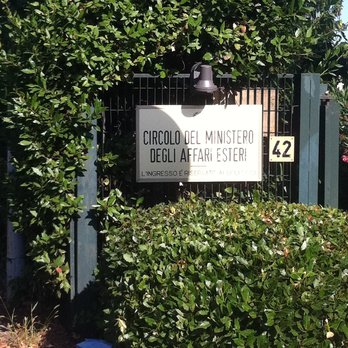On March 24, 2015, RIAC Director General Andrey Kortunov, RIAC Member Andrey Melville, Head of Political Science Department at Higher School of Economics and manager of RIAC project "Globalization 2.0: New Approaches to Teaching and Research", and RIAC Program Manager Tatiana Bogdasarova were in Rome at the Italian Foreign Ministry club to hold talks with Rector of Venice International University Ambassador Umberto Vattani, Ambassador Laura Mirachian of the Universita degli Studi di Padova and the faculty of five Italian universities.
On March 24, 2015, RIAC Director General Andrey Kortunov, RIAC Member Andrey Melville, Head of Political Science Department at Higher School of Economics and manager of RIAC project "Globalization 2.0: New Approaches to Teaching and Research", and RIAC Program Manager Tatiana Bogdasarova were in Rome at the Italian Foreign Ministry club to hold talks with Rector of Venice International University Ambassador Umberto Vattani, Ambassador Laura Mirachian of the Universita degli Studi di Padova and the faculty of five Italian universities.
The Italian delegation included Professor of Economics Mario Volpe of the Ca Foscari University of Venice; Professor Fabio Grassi, Director of Eurasian Studies Center at Universita La Sapienza; Professor Gustavo Piga of Economics Department at Universita degli Studi di Roma Tor Vergata; Professor Daniele Fiorentino of Political Science Department at Universita degli Studi di Roma 3; and Professor Luca Ratti of the Universita degli Studi di Roma 3.
The participants summed the results of the first stage of project "Globalization 2.0: New Approaches to Teaching and Research", inclusion of five Italian state universities, and discussed the agenda for the second Russian-Italian seminar with new Italian participants.
Dr. Kortunov stressed that the "Globalization 2.0" project makes a major part of RIAC's portfolio, representing the think tank's attitude to topical issues of Russian-Italian cooperation in the realm of higher education at the bilateral forum Russian-Italian Civil Society Dialogue.
Dr. Melville briefed the gathering on the research performed by the Russian side on the bachelor and master levels at the ca Foscari University, University of Torino, the VIU and University of Padua to survey the depth of the subject matter and novelty of literature, as well as full-fledged or partial use of their curriculums by Russian universities. Some of the courses and components of their majority appear adaptable to Russia, while certain Russian universities may as well offer master-level curriculums on global security that seem to be neglected by the Italian practice.
Rector Vattani pointed out that the universities of the two countries should focus on training skilled professionals for handling global and international matters, as well as for the search of appropriate mechanisms and tools, while the exchanges on master and bachelor level courses within the Russian-Italian project help a lot for reaching these aims.
Ambassador Mirachian suggested augmenting the globalization master courses with governance of global processes and to this end with the global government issues. Consenting on the timeliness of the matter, the Russian side emphasized the need for the problem-oriented approach to establishment of master-level training.
The negotiators also discussed the agenda for the second Russian-Italian seminar to be held next May 28-29 in Kaliningrad at the Baltic Federal University. The Italians agreed to a peer review of the Russian and Italian globalization curriculums for their subsequent refinement. The agenda should also cover implementation of bilateral projects on such global issues as migration, terrorism, sustainable development and cultural heritage, democratic governments and nation states.
The session was finalized by a discussion of prospects for the project that may later include exchanges of curriculums and programs on globalization, reciprocal faculty visits, development of student mobility, as well as joint winter and summer schools for young educators of the two countries.
The Russian delegation also met the faculty of the Political Science Department at Roma 3 University, among them Professor Francesco Guida, Professor of Demography Annunziata Nobile and Dr. Leila Tavi, who expressed their support to project "Globalization 2.0".




